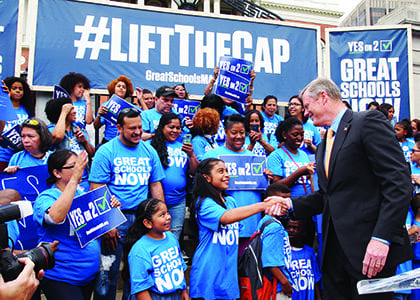Lift the cap launches ballot campaign with rally
Opposing side focuses strategy on door to door

Charter school supporters assembled before the State House last week to officially kick off the ballot campaign to lift the cap on charter schools, one of the four referendum items appearing before voters in November. While Great Schools Massachusetts has been organizing well-staged lift-the-cap rallies in Boston for more than a year and spreading their message through other media, last Thursday’s event was the first to officially launch a campaign to secure the lift via a ballot measure.
On November 8, voters across the commonwealth will decide if the state may approve 12 additional charter schools a year, which appears as Question 2 on the ballot.
Rows of parents, advocates and children lined the steps of the State House in matching blue “Great Schools Now” T-shirts. They were accompanied by large professional-looking banners and music, filming and lighting from Lawrence-based Productions Inc, an audio-visual provision and event production company. KIPP charter school parent Dawn Foye, Democratic senator Michael Rodrigues and Governor Charlie Baker comprised the speaker lineup.
Meanwhile, Save Our Public Schools, the coalition advocating for a “No” vote on Question 2, sought to bring attention to its cause, as well. Two Newton teachers stood to the side of the charter rally holding hand-made signs, while a team of SOPS members made a canvassed bystanders and passerby in the area around the State House and Boston Common.
The Great Schools MA rally, originally planned to take place within the State House, was moved outside following SOPS’s objections to the use of state resources for such a campaign.
SOPS mobilizes
While Great Schools MA consistently utilizes professional-looking rallies, SOPS says their strategy’s main focus is knocking on doors and holding individual discussions.
“We’re not trying to match their [the charter campaign’s] presence or fancy high-production film equipment,” Lisa Guisbond, executive director of Citizens for Public Schools, told the Banner.
SOPS’ promotion efforts include inviting volunteers to host house parties and forums to discuss the issue and speak at community events. Jannae Knospe, SOPS communications director, said volunteers have attended hundreds of community meetings, leading to more than 140 endorsements, with 66 from school committees.
SOPS’ field staff consists of 17 people. They have mobilized students, teachers, parents and community members to go door to door as well as call voters, Knospe told the Banner. She said that so far, they have covered every major city and many towns throughout the state.
Messages solidify
The State House rally and nearby canvassing reflected key talking points in each side’s message. Charter advocates presented the cap as a barrier blocking children from quality education, with Foye calling it “shameful.” She said the law that deprived her child of a high school offering from the same charter network in which he is enrolled as an elementary school student. Baker pointed to the charter school waitlists, currently comprising approximately 32,600, according to the Department of Elementary and Secondary Education. This is a flashpoint: accuracy and significance of waitlist counts has been hotly contested throughout the charter school debate.
High on the list of SOPS talking points: the budget strain charter schools represent for districts, especially given the decline in state reimbursements.
“The loss of $400 million is already happening with the cap”, Knospe told the Banner. If the cap is lifted, “it’ll siphon off millions more.”
Boston Public Schools have been struggling with budget shortfalls at a time when the state is failing to fully reimburse municipalities for charter school tuition. When Boston Mayor Martin Walsh presented his original fiscal year 2017 proposal, he said charter tuition payments comprised five percent of the city’s budget.
Charter school proponents argue that their schools provide opportunity and options especially for low-income families who may have few alternatives to district schools, some of which are underperforming. Meanwhile, opponents of lifting the cap highlight the disproportionately high suspension rates experienced by minority and special education children at some charter schools and say the remedy to any underperforming district school is to provide it with enough resources to meet needs and institute new and known solutions, not increase the number of charters, which further depletes the limited resources municipalities have available for their public schools.


![Banner [Virtual] Art Gallery](https://baystatebanner.com/wp-content/uploads/2024/04/Cagen-Luse_Men-at-store-e1713991226112-150x150.jpg)



